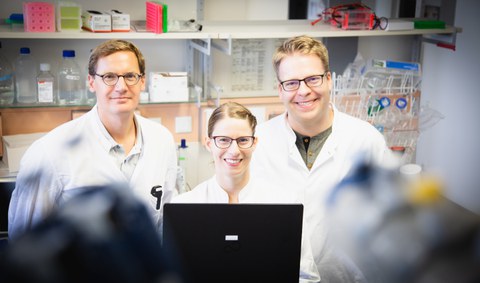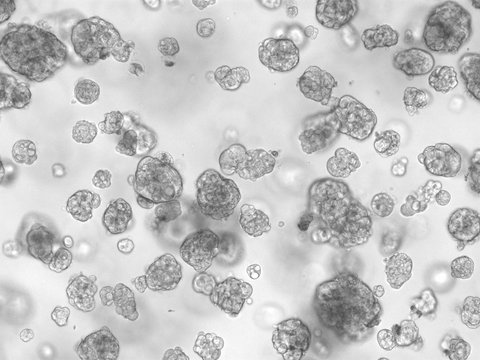Aug 23, 2024
Current study shows novel approach for the individualized treatment of esophageal cancer and gastric cancer

Prof. Daniel Stange, MSc Juliane Fohgrub, Tim Schmäche, scientific doctoral student in the laboratory of Prof. Stange
The study was published in the Molecular Cancer journal and gives hope to patients with malignant tumors in the esophagus and stomach that are detected at locally advanced stage. An interdisciplinary team of clinicians and scientists led by Prof. Daniel Stange, Senior Physician and Head of the Surgical Research Laboratory and Surgical Study Center at the Carl Gustav Carus University Hospital Dresden, and Tim Schmäche, scientist at the National Center for Tumor Diseases (NCT) Dresden, have now succeeded in finding a novel approach for individualized treatment of this life-threatening type of cancer.
The National Center for Tumor Diseases (NCT) is a long-term cooperation between the German Cancer Research Center (DKFZ), excellent partners in university medical centers (UMCs) and other research institutions at various locations in Germany.

Light microscope image with 100x magnification of an organoid culture established from a gastric carcinoma
The Dresden research team investigated patient-derived organoids (PDOs) from tumors of the esophagus and stomach. These 3D cultures from tumor cells are “mini-tumors” that recapitulate the tumor in cell culture in a variety of ways. The research team used these PDOs to test whether the different responses of patients to the most effective chemotherapeutic treatment plan in gastric and esophageal cancer observed in the clinic could be simulated in the laboratory.
Using an innovative laboratory examination of the PDOs, the scientists developed a test with predictive value for the response to the FLOT chemotherapy treatment regimen. This test makes it possible to classify patients with malignant tumors in the esophagus and stomach into therapy responders and non-responders.
“The study underlines the importance of personalized treatment approaches in oncology,” explains Prof. Esther Troost, Dean of University Medicine Dresden. “The ability to predict the individual response of patients to therapies can lead to a significant improvement in treatment outcomes and quality of life.”
Study and methodology
The method of the study “Stratifying esophago-gastric cancer treatment using a patient-derived organoid-based threshold” involved the culture of endoscopic biopsies from patients with locally advanced esophago-gastric adenocarcinoma. Once the PDOs had been propagated, the response of the PDOs to the individual substances of the currently most effective treatment regimen for patients with locally advanced esophago-gastric cancer and to the combination treatment were correlated with the pathological response of the patients to the same therapy.
The results of the study show a promising predictive accuracy of EGC PDOs with regard to therapeutic effects in tumor and cancer cell characteristics, i.e. the histological response of patients to FLOT treatment.
"Using the PDO-based FLOT test, we can distinguish FLOT responders from non-responders with high sensitivity and specificity. Non-responders could thus be spared the side effects of FLOT therapy and may be offered alternative and more effective therapies in the future,” says Prof. Daniel Stange, explaining future applications of the test system.
The researchers are now planning to validate their results in further studies and explore the potential clinical use of this method.
The full study is available under the following DOI: DOI: https://doi.org/10.1186/s12943-023-01919-3
Contact:
National Center for Tumor Diseases Dresden (NCT/UCC)
Fetscherstraße 74/PF 64
01307 Dresden
+49 351 458 3371
Anne-Stephanie Vetter
Staff Unit Public Relations of the Carl Gustav Carus Faculty of Medicine
at TUD Dresden University of Technology
National Center for Tumor Diseases (NCT/UCC) Dresden
+49 351 458-17903
anne-stephanie.vetter@tu-dresden.de
www.tu-dresden.de/med
NCT/UCC Dresden
The National Center for Tumor Diseases Dresden (NCT/UCC) is a joint institution of the German Cancer Research Center (DKFZ), the Carl Gustav Carus University Hospital Dresden, the Faculty of Medicine at TUD Dresden University of Technology, and the Helmholtz-Zentrum Dresden-Rossendorf (HZDR).
The NCT has made it its duty to closely link research and patient care wherever possible. It is a long-term cooperation between the German Cancer Research Center (DKFZ), excellent partners in university medical centers (UMCs) and other research institutions at various locations in Germany. The aim of the NCT is to translate innovations in cancer research in Germany into studies in a targeted and rapid manner in order to cure cancer while maintaining a high quality of life. Patients are research partners on an equal footing.
The Dresden center draws on the structures of the University Cancer Center Dresden (UCC), which was founded in 2003 as one of the first Comprehensive Cancer Centers (CCC) in Germany. Since 2007, the Dresden Center has been honored by the German Cancer Aid e.V. (DKH) as a "Top Oncological Center" on a continuous basis.
